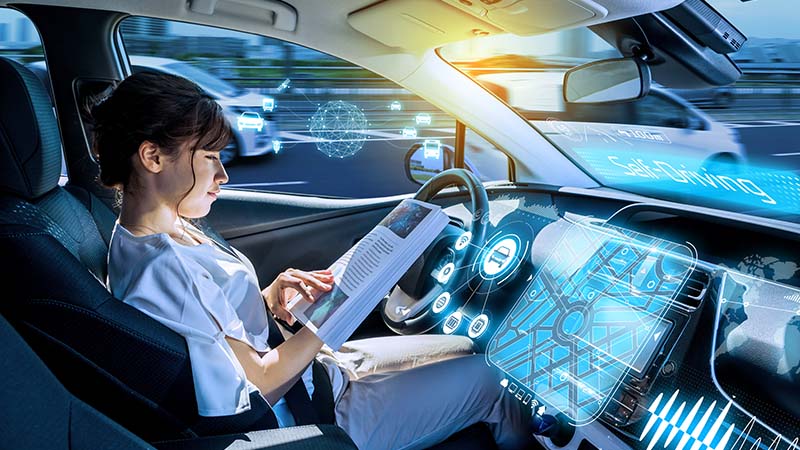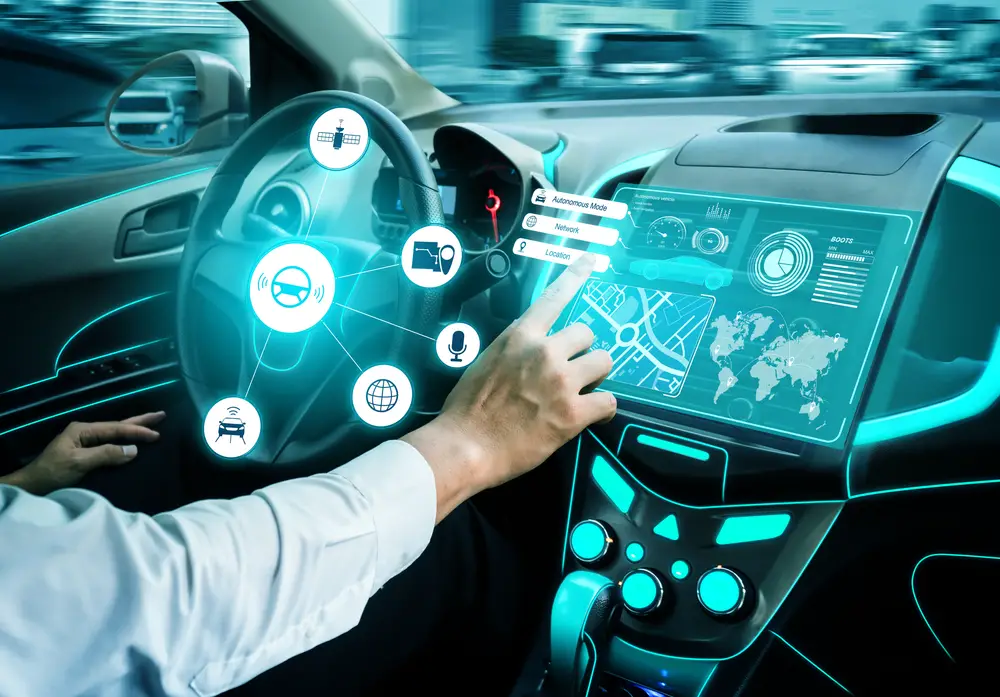Artificial intelligence (ai) is playing a significant role in automotive cybersecurity by safeguarding vehicles from cyberattacks. With the increasing connectivity in cars, the risk of cyberattacks has also risen.
Ai helps in detecting potential threats and vulnerabilities in the system and takes proactive measures to prevent cyberattacks. At present, ai is being used in various aspects of the automotive industry, including security, entertainment, and autonomous driving. As ai technology advances, it is expected that its use in cybersecurity will increase drastically, making vehicles safer for passengers and drivers alike.
In this article, we will explore the role of ai in automotive cybersecurity and how it is changing the automotive industry.

Credit: www.fujitsu.com
The Growing Need For Automotive Cybersecurity
The need for automotive cybersecurity is rapidly growing in the modern world where vehicles are becoming increasingly computerized, automated, and connected. Without adequate safeguards, smart cars could be vulnerable to hackers, cybercriminals, and other malicious actors who may exploit the vulnerabilities in their systems.
In this blog post, we will explore the various ways in which ai is being used to safeguard vehicles against cyber threats.
The Importance Of Automotive Cybersecurity
Vehicle safety is not just about protecting passengers in the event of a crash. Nowadays, smart vehicles are equipped with multiple systems and technologies that make them efficient, comfortable, and connected. However, this interconnectedness also exposes them to cyber risks, which could compromise the integrity, confidentiality, and availability of data and services.
- Protecting personal data: Smart vehicles collect, store, and transmit vast amounts of data about the driver, passengers, and surroundings. This data could include personally identifiable information, vehicle history, location, and behavior. Cyber attacks can expose this data to unauthorized parties, leading to identity theft, fraud, and other forms of harm.
- Preventing remote access and control: Hackers could find vulnerabilities in a vehicle’s software and gain remote access to its systems, including the engine, brakes, and steering. This could enable them to take control of the vehicle, cause accidents, or hold the driver for ransom.
- Ensuring system reliability and functionality: A cyber attack on a vehicle’s systems could render it inoperable or malfunctioning, leading to potential safety hazards, financial losses, and inconvenience.
The Growing Sophistication Of Cyber Threats
As vehicles become more integrated with digital technologies, the scope and sophistication of cyber threats are also increasing. Cybercriminals can use various methods to exploit vulnerabilities in a vehicle’s systems and gain unauthorized access.
- Phishing: Using social engineering to trick vehicle users into revealing sensitive information, such as passwords, email addresses, or financial details.
- Malware: Injecting malicious code into a vehicle’s software to gain control over its systems or steal data.
- Denial of service (dos) attacks: Overloading a vehicle’s systems with excessive traffic or requests to render it unresponsive or unavailable.
- Remote code execution: Executing unauthorized commands on a vehicle’s systems to take control of its functions, such as accelerating, braking, or steering.
How Ai Is Advancing Automotive Cybersecurity
Artificial intelligence (ai) is playing a critical role in detecting and preventing cyber threats in vehicles.
- Real-time monitoring: Ai-powered systems can continuously monitor a vehicle’s systems and detect anomalies, suspicious activities, or potential threats before they cause harm.
- Predictive analytics: Ai algorithms can learn from past behaviors and patterns to predict future cyber threats and take proactive measures to mitigate them.
- Threat detection and response: Ai can help identify and prioritize cyber threats based on their severity, origin, and impact, and initiate automatic responses to mitigate them.
- Behavioral biometrics: Ai can use voice recognition, facial recognition, and other biometric measures to authenticate users and prevent unauthorized access.
- Encryption and decryption: Ai can enable robust encryption and decryption of sensitive data transmitted between vehicles and other devices, making it harder for cybercriminals to intercept or steal.
The growing need for automotive cybersecurity cannot be overemphasized, given the increasing interconnectivity and dependence of vehicles on digital technologies. The use of ai in detecting and preventing cyber threats in vehicles is a promising approach that is evolving rapidly.
As the automotive industry continues to innovate and prioritize cybersecurity, consumers can look forward to safer and more reliable vehicles.
How Ai Can Help Protect Vehicles From Cyber Threats
Safeguarding Vehicles: The Role Of Ai In Automotive Cybersecurity
As vehicles matured, they became increasingly complex with the integration of modern technology. This complexity made vehicles vulnerable to cyber threats, and this vulnerability can put the safety and lives of people at risk. This is where ai comes into play.
Today, let’s talk about how ai can help protect vehicles from cyber threats.
Detecting And Preventing Attacks
Ai can help detect and prevent attacks against vehicles by using machine learning algorithms that can detect malicious behavior. Machine learning algorithms can detect patterns that indicate malevolent activities, facilitating the identification and prevention of attacks. Ai can help in identifying attacks such as malware, ddos attacks, and many others, using algorithms to prevent them.
- Ai can easily trace back the attack to the originator.
- It can encrypt data in transit to prevent snooping and tampering.
- Ai can recognize unknown threats that have not been identified by humans.
Remote Monitoring And Protection
Ai can be used to monitor vehicle performance, allowing early detection of any anomaly or suspicious activity regarding the vehicle’s performance. This can help experts in identifying system vulnerabilities and patching them before they are exploited in cyber attacks.
- Ai can monitor the vehicle’s ecu and other systems to ensure that they operate according to specification.
- It can help identify vehicle system vulnerabilities and detect potential security threats.
- Ai can oversee the vehicle’s safety systems to prevent any malicious action, such as disabling the brakes or safety features.
Enhanced Authentication And Access Control
Ai can assist in the authentication and access control mechanisms of vehicle components and systems. By using biometric authentication or other advanced methods, access to the vehicle can be limited to authorized parties only.
- Ai can help identify and authenticate vehicle users and personnel.
- It can impose granular access controls and role-based permissions to ensure that only authorized personnel can access sensitive vehicle components and systems.
- Ai can detect unusual user behavior and lock accounts if necessary.
As vehicles become more technologically advanced, cybersecurity is becoming increasingly important. While it is vital to protect the vehicle itself, it is also important to safeguard the passengers and other individuals in the vicinity of the vehicle. Ai can help enhance vehicle security by detecting and preventing attacks, monitoring vehicle performance, and controlling access to sensitive vehicle components and systems.
Remember, as artificial intelligence technology evolves, so do the methods and tactics employed by cybercriminals. Cybersecurity continues to be a significant problem, and it must be a top priority for automakers to consume ai technology to safeguard their latest vehicles.
The Future Of Automotive Cybersecurity
As technology continues to advance, protecting vehicles from cyberattacks is becoming increasingly crucial. With this in mind, the role of ai in automotive cybersecurity is set to play a key role in ensuring safety on the roads.
- Cloud-based security solutions: New cybersecurity solutions are being created that will use cloud technology to monitor a vehicle’s internal network continuously. These solutions can detect any suspicious activity and provide over-the-air updates and patches to keep a driver’s data secure.
- Threat detection and prevention: Ai can be used to detect and prevent all types of cybersecurity threats, including malware, ransomware, and denial-of-service attacks. Ai can quickly identify abnormalities, detect suspicious activity, quarantine infected software, and proactively develop solutions to prevent malicious attacks before they happen.
- Real-time monitoring and analysis: Ai algorithms have the potential to identify and monitor security vulnerabilities in real-time, such as driver behavior, system software, and firmware vulnerabilities. This monitoring can be used to ensure safety and cybersecurity in areas like remote vehicle control, theft prevention, automatic software updates, and diagnostics.
- Automated security patches and updates: As with any technology, the risk of exploiting vulnerabilities in software and firmware is always present. With ai, it’s possible to develop automated security patches and updates that are issued and applied to all connected vehicles.
As ai continues to develop at a rapid pace, it will play a crucial role in securing the automobiles of tomorrow. By leveraging machine learning and the vast amounts of data generated by vehicles, automakers can develop a multi-layered approach to cybersecurity that will ensure drivers are protected from cyberthreats on the road.
Frequently Asked Questions For Safeguarding Vehicles: The Role Of Ai In Automotive Cybersecurity
What Is Automotive Cybersecurity?
Automotive cybersecurity involves protecting vehicles against unauthorized access and potential cyber threats by employing various technological solutions.
How Important Is Automotive Cybersecurity?
With the increased use of technology in vehicles, ensuring their cybersecurity has become increasingly important to protect against potential cyber attacks and maintain passenger safety.
What Role Does Ai Play In Automotive Cybersecurity?
Ai can help protect vehicles against potential cyber threats in real-time by identifying and responding to suspicious activity, preventing unauthorized access, and minimizing the risk of cyber attacks.
What Are The Benefits Of Using Ai In Automotive Cybersecurity?
Using ai in automotive cybersecurity can help vehicles identify and prevent cyber threats in real-time, improve response times to attacks, and provide better overall protection for both drivers and passengers.
How Can Individuals Protect Their Vehicles From Cyber Attacks?
Individuals can help protect their vehicles by regularly updating software and ensuring they have strong and unique passwords. They should also consider installing security features and avoiding connecting their vehicles to unsecured networks.
Conclusion
Protecting our vehicles from cyberattacks has become a major concern in today’s digital era. The rise of ai in automotive cybersecurity has led to the development of advanced defense mechanisms and security protocols. Ai-powered solutions are capable of detecting and preventing cyber threats in real-time, providing a seamless driving experience to consumers.
The automotive industry can leverage ai and machine learning technologies to enhance the security of vehicles and protect against unauthorized access, hacking, and data breaches. As ai continues to evolve, it is certain that it will play a pivotal role in the future of automotive cybersecurity.
With the ever-increasing number of connected vehicles on the roads, it is crucial that automakers prioritize cybersecurity and implement robust measures to safeguard vehicles from potential cyber threats. Ai-powered solutions hold immense potential and are set to transform the landscape of automotive cybersecurity in the years to come.


